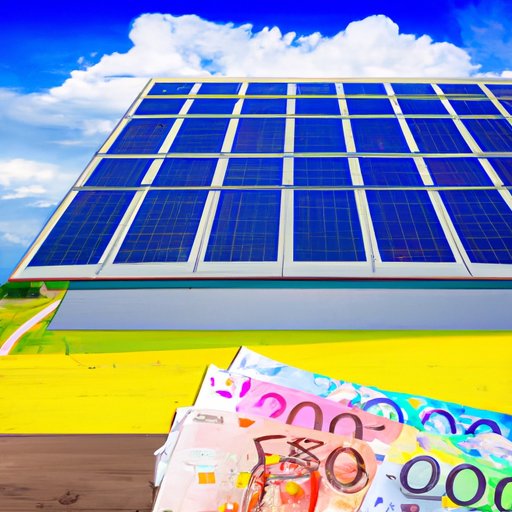Introduction
Solar energy is a renewable source of power that is becoming increasingly popular as an alternative to traditional energy sources. Solar energy is generated by capturing sunlight and converting it into electricity. This electricity can then be used to power homes and businesses. While there are many benefits to going solar, one of the main considerations for homeowners and business owners is the cost.
Cost Comparison of Solar vs Non-Solar Energy Sources
When considering the cost of solar energy, it is important to compare it to the cost of non-renewable energy sources such as coal, natural gas, and oil. According to a study conducted by the National Renewable Energy Laboratory (NREL), the cost of solar energy has declined dramatically over the past decade, making it more competitive with traditional energy sources. The NREL study found that the average levelized cost of electricity (LCOE) for utility-scale solar photovoltaic (PV) systems was $0.054 per kilowatt-hour (kWh) in 2020, compared to $0.062/kWh for natural gas and $0.079/kWh for coal. This means that solar is now cheaper than both natural gas and coal in most parts of the United States.

An Overview of the Costs of Installing a Solar Panel System
The cost of installing a solar panel system will vary depending on the size of the system, the location, and the type of equipment used. The initial cost of installing a residential solar system typically ranges from $15,000 to $30,000. This cost includes the purchase and installation of the solar panels, the inverter, and other necessary equipment. In addition to the initial cost, there are also ongoing maintenance and repair costs. These costs are typically minimal and include items such as replacing batteries or cleaning the solar panels.

Calculating the Return on Investment of Going Solar
One of the major benefits of going solar is the potential for significant savings on your energy bill. To calculate the return on investment of going solar, you need to estimate your current and future energy usage and compare it to the cost of the solar system. You should also factor in any potential incentives, such as federal or state tax credits, that you may be eligible for. Once you have calculated the estimated savings, you can then determine your payback period, which is the amount of time it will take for the system to pay for itself.
Analyzing the Financial Benefits of Solar Energy
In addition to calculating your return on investment, it is important to consider the financial benefits of going solar. Many homeowners and business owners are eligible for financing options such as loans or leases that can help reduce the upfront cost of the system. Additionally, there are numerous government incentives available for those who choose to go solar. These incentives can include federal and state tax credits, as well as local rebates. By taking advantage of these incentives, you can significantly reduce the cost of going solar.

Exploring the Tax Incentives for Going Solar
One of the most significant financial benefits of going solar is the availability of tax incentives. The federal government offers a tax credit of up to 26 percent of the total cost of the system. Additionally, some states and local governments offer additional incentives such as property tax exemptions or sales tax exemptions. These incentives can significantly reduce the cost of going solar and make it more affordable for homeowners and businesses.
Conclusion
Going solar is a great way to reduce your energy costs and take advantage of the many benefits of renewable energy. By understanding the costs associated with installing a solar panel system, exploring financing and government incentive options, and calculating your return on investment, you can make an informed decision about whether or not going solar is right for you. In the long run, going solar can provide significant savings on your energy bills and help protect the environment.
(Note: Is this article not meeting your expectations? Do you have knowledge or insights to share? Unlock new opportunities and expand your reach by joining our authors team. Click Registration to join us and share your expertise with our readers.)
